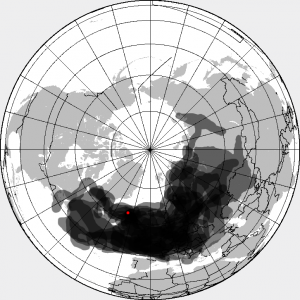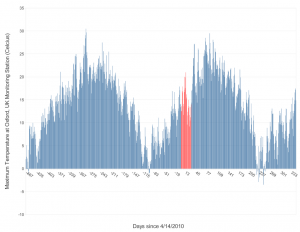About a year ago, I made the following prediction [1] about European temperatures in the wake of the eruption of Eyjafjallajökull in Iceland [2]:
So I make a prediction, as a very amateur climate science armchair guy. I predict that Europe will experience unusually cold temperatures in the next year. In the next days, this will likely be a combination of the lack of contrails and the ash, but once air travel is restored I’ll wager that local temperatures in the European continent will still go unusually cold this coming year due to the ash. (From [1])

Well, I was only briefly right . . . maybe. I grabbed some maximum temperature data for a monitoring station in Oxford, UK, which according to the composite plume map [2] was CLEARLY affected for weeks after the eruption. I obtained date and maximum temperature information from [3].
The data are shown in the plot below. The hump on the left is the winter-summer-winter cycle for 2009, and the hump just to the right of middle is the winter-summer-winter cycle for 2010. The 2011 data is the trend on the far right. The red area indicates the 30 days after the eruption. Time on the x-axis is given relative to 4/14/2010, the day the ask cloud appeared.
The data shows that about 10 days after the ash cloud began, maximum temperatures at the monitoring station started to decrease for about 10-15 days. By about 45 days after the eruption, temperatures were already climbing back to summer normals. Comparing to 2009 data, there aren’t too many other differences between 2010 and 2009. So while there was a neat little downward blip in the temperatures, things seem to restore fairly quickly.
It would be neat to see a really deep quantitative analysis to know if there were more subtle effects. But I’d say I missed the mark on that call. That’s what I get for extrapolating from the volcanic eruption the Ben Franklin experienced while in France near the end of the American Revolution. Damn you, Ben Franklin.

[1] http://steve.cooleysekula.net/blog/2010/04/17/aerosols/
[2] http://en.wikipedia.org/wiki/2010_eruptions_of_Eyjafjallaj%C3%B6kull





